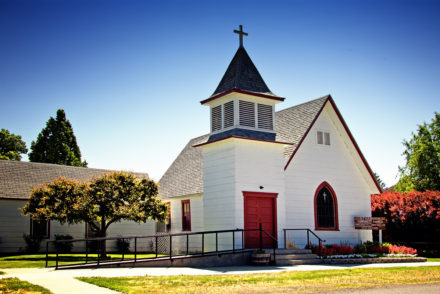“I therefore, a prisoner for the Lord, urge you to walk in a manner worthy of the calling to which you have been called, with all humility and gentleness, with patience, bearing with one another in love, eager to maintain the unity of the Spirit in the bond of peace. There is one body and one Spirit—just as you were called to the one hope that belongs to your call—one Lord, one faith, one baptism, one God and Father of all, who is over all and through all and in all. But grace was given to each one of us according to the measure of Christ’s gift.”
Ephesians 4:1-7
In the passage above Paul is writing to the church in Ephesus while a prisoner for the Lord. He is writing in a way that should lead the Ephesians to understand a couple of things: that he loves them, that they are called to walk in a manner worthy of the Lord and that everyone in Christ has a common ground that they should base their unified ministry out of.
Paul doesn’t command the Ephesians to live like Christ, but instead he “urges” them as a brother in the faith who cares for their souls. As one in chains for the sake of the gospel, Paul is standing in the middle of his authority to exhort his brothers and sisters in the faith. Unlike many today who claim “Do what I say and not what I do,” Paul was an immediate expression of what he was preaching.
Paul urges his fellow believers “…to walk in a manner worthy of the calling to which you have been called,” and one should note the emphasis that Paul is placing on “calling” using the word twice in such a short span. Paul is making clear that those who are followers of Christ have been called (1 Peter 2:9) to a different life, to a new creation in Jesus (2 Cor 5:17). Those who are in Christ no longer live as one who is of the world (Eph 2:2), but as one who was bought with a price (1 Cor 7:23).
Luke writes about the cost of following Jesus saying, “Yet another said, ‘I will follow you, Lord, but let me first say farewell to those at my home.’ Jesus said to him, ‘No one who puts his hand to the plow and looks back is fir for the kingdom of God.’ ” (Luke 9:61-62) Often this passage is used to highlight the commitment that one should make in being obedient in all circumstances to follow the Lord and value one’s relationship with Christ above earthly ones, but here it should be noted that putting your hand to “the plow” involves work after the fact. When a farmer puts their hand to the plow, they are starting their work, and in the same way, those that are called out by Christ should begin their work to advance His kingdom through making disciples and building the church.
Paul then moves on to let his readers know how they are to work in the church, and the qualities that befit one who is serving the Lord. He speaks of patience, gentleness and bearing with one another; all of these attributes are those of God and are some of the ways that He interacts with humanity to reveal Himself. Paul wants those in the church to know what it will take to continue on in the unity that should be found in having one Father.
He writes that they should be “eager to maintain the unity of the Spirit,” noting that believers are not called to create this unity, but to strive to maintain it among those in the church.
Following this urging, Paul shows the Ephesians the unity that is found in their submission to Christ by stating “There is one body and one Spirit…,” and this is done to show the common ground that all believers possess. This passage should serve as a reminder to the church today that even in different evangelical denominations, the footing in Christ and the content of the gospel is the common framework that all who follow Jesus are found in.
While Christians may have differences with one another, they must be people who are set apart in the grace of God acknowledging that before the throne of God they are all helpless sinners forgiven by a loving God through the blood of Christ. This most-humbling of understandings allows for proper self-perception and an account to dispense eternal grace to others, because it has been so freely given (Luke 7:36-50).
Paul finishes this passage by bringing in the knowledge that all believers have been gifted by God to serve and build up the church, and that each believer should utilize their giftedness for this purpose in the body (1 Cor 12). Each member has not been gifted in the same way, but each has been blessed by God to be a useful member of the body.
This passage should reassure believers that they are loved by God and equipped to do all that He has called them to (Phil 1:6). Christ meets sinful people where they are, saves them from their sin, imputes His righteousness (2 Cor 5:21) to them and gifts the believer with His attributes like teaching, leading, serving and patience so that they can now image God to the world and assist other believers by encouraging them to press on in obedience (Prov 27:17).
Paul wants the Ephesians to know that they are a unit in Christ, and that this faith family—founded in the blood of Jesus—should walk in a manner worthy of His blood. This is done by sharpening and strengthening one another and by remembering and reflecting on the basis of this unity.
Today, remember believers who are suffering in situations where forgiveness and patience must be extended. Think about those that desire to love Christ but are being beaten down by the world, and pray for those who want to serve God but need the encouragement of the body. Encourage, equip, serve, love and extend the grace of God to those who are in need.





